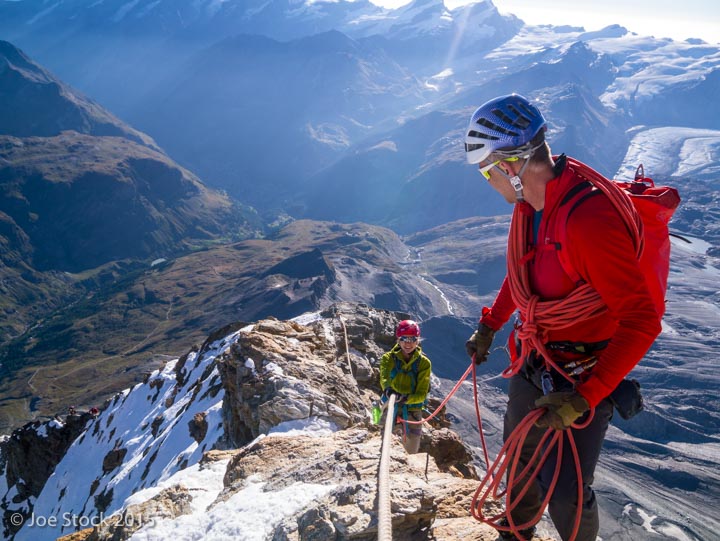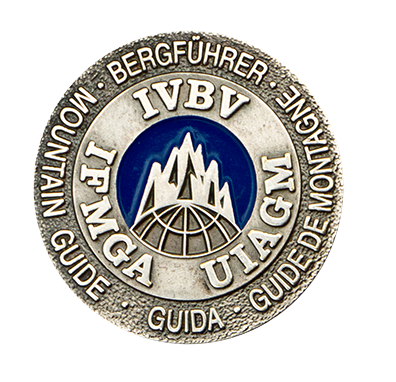Managing Guide Expectations
Suggestions to Survive the Guiding Life

"This is the rock and roll lifestyle!" Dale said as we walked back to our hotel in Zermatt. We had just gorged on pizza and expensive wine with our clients. Earlier in the day, we guided them to the summit of the most iconic mountain in the world, the Matterhorn, via the Hornli Ridge. What a job!
* * *
Mountain guiding can be the dream job: traveling the world, showing people a good time in the mountains, staying fit and tan. But it's not always like this. High-maintenance clients can drain your energy. Guiding the same route over and over becomes monotonous. And early starts and long days pile on exhaustion.
Guiding is not straightforward. You don't know what to expect, whether it's your first guiding job or you're newly pinned. You ask yourself: How long can I do this job? How much will I make? How do I treat the clients? What follows are the main considerations that can help put guiding in perspective.
1) Guiding is a service industry.
The product we deliver is service. Guides work for the client. This means the client is gold and should be treated as such.
While some clients may be difficult to work with, most are not. Your clients are successful, adventurous people. Treat them as friends and have fun spending time with them. Learn about your clients by listening to their stories and asking questions. Some clients are looking for camaraderie as much as a rope leader. Tell your stories, but keep them in check. It's a fine line between telling stories that they like to hear and tooting your own horn.
Treat all clients with respect. For example, do not lose your temper at clients or treat them in a condescending way. Guides who show anger at clients are often doing so because they gave poor instructions and the client did the wrong thing as result. Similarly, if you assume that clients are trying to kill you, then learn to increase your security in a tactful way. Remember humility; you are just a guide providing a service for a client.
2) You don't get paid to climb.
Climbing and guiding are separate things. Yes, there are glory days when you can't believe you're getting paid for the work, but those days are rare. Guiding is about taking care of people in the mountains. It will sap your energy for climbing and can burn you out from climbing altogether. If you just want to climb or ski, don't become a guide. Get a non-guiding job and climb in your free time. If you have minimal debt, it's possible to live on little money and climb more than any guide.
3) Guiding may not be your calling.
Burnout and disillusion are common in guiding. This often stems from low pay, disrespect from guide services, summit-obsessed clients, and a difficult US work environment. A key to surviving the work is to find balance through variety. In a recent AMGA forum on this subject, IFMGA Mountain Guide Chris Simmons noted that long-term guides "seem to balance work and family and play." Mix up your work with both guiding and instruction. Work in a variety of venues, foreign and local, rock and alpine. If you're feeling truly burned out, take some time off. Trying other types of work may restore your interest in guiding and your commitment to certification. IFMGA Mountain Guide Jayson-Simons Jones added that "questioning guiding as a profession is a totally natural thing. Any guide that has been doing this whole-heartedly for any amount of time has had to re-commit and has had moments of doubt and questioning." And IFMGA Mountain Guide Tico Allulee wrote, "If you don't love guiding, don't. It's hard and dangerous."
4) Guiding is a difficult profession.
Until recently, most guides were in their twenties, when living on $10,000 a year was possible. It wasn't a job where you could pay a mortgage, support a family, and retire someday. Now, some career guides make a livable wage. But it doesn't come easy. It is a competitive field.
Guess who is the guide.
Successful guiding takes hard work. There are long days: guiding, planning, staying up late to check e-mail, alpine starts, rising early for guide meetings...day after day. It becomes exhausting and can take days to recover.
Guiding is performance-based. You have to do well to get paid well. You are not entitled to good pay just because you've climbed some hard routes or received your Alpine Guide cert or your pin. You have to do a good job, please your clients, avoid accidents, and do it reliably year after year.
Another difficulty is that guides don't receive formal training in business, although business skills are necessary for successful guiding. Business owners often look to make money from naive young guides. It's up to you to learn negotiating skills, money management, and spreadsheet programs. Most guides use a trial-and-error method, and end up losing money and being taken advantage of in the process. Mentoring and formal training are better avenues for learning the business of guiding, but you must seek this knowledge on your own.
5) You are just a guide.
Guides are a proud group. It takes confidence and skill to lead people into the uncertainties found in the mountains or through the logistical abyss of international travel. But keep your pride in check. You are just a guide.
As a new, young guide, you might, for the first time, receive validation from an elder that you are good in the mountains. Unfortunately, this can go to a young guide's head and lead to a sense of superiority that is not compatible with good guiding. Keep in mind that, while you may have talent, you are no more talented than your clients. Your clients are probably more successful in their own fields than you are at guiding. Put yourself in the clients’ shoes. How would you handle being in the court room, the pressures of managing a hundred employees, or working eight to five, five days a week?
The Dunning-Kruger effect explains that relatively unskilled individuals think their ability is much higher than it truly is. In other words, the more you think you know, the less you actually do know. In the mountains, if you think you're really good, you are probably not that good. More experience, including experience in other ranges, will give you a more realistic and humble perspective on your ability.
* * *
Initially, guiding is exciting. Everything is new. You're getting paid to travel and climb and ski. As guiding becomes a career, it also becomes more like regular work. While you will occasionally be treated to perfect conditions with the perfect clients, on most days it will feel like a regular job, where you are just a guide, providing a service for a client...hopefully still aware that you are working your dream job.
More Reading
AMGA Professional Members Forum, facebook.com, accessed September 26, 2015.
On Being a Guide, by SP Parker, AMGA Technical Handbook.

